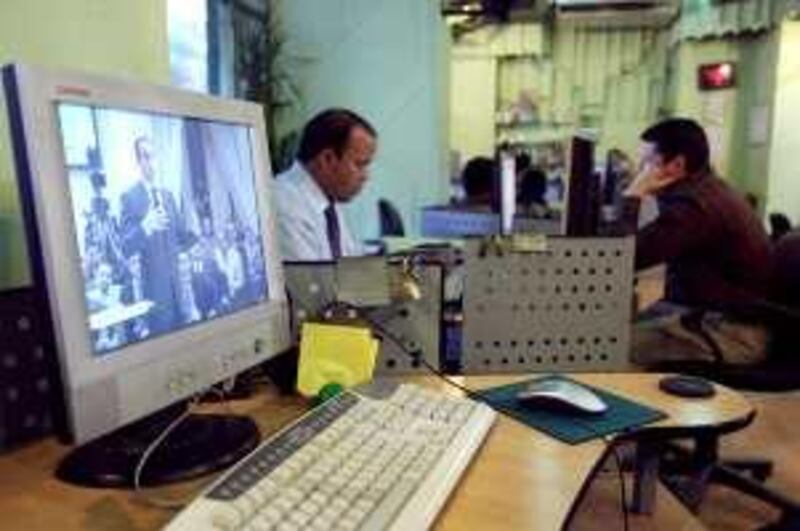CAIRO // The son of Egypt's president - and the man who is widely thought to be the heir apparent to the country's leadership - answered questions from Egyptian youths last night in an online video forum. The forum was aimed at endearing Gamal Mubarak, whose father, Hosni Mubarak, has been the president of Egypt for 27 years, to young Egyptians. But by reaching out to youths over the internet, the younger Mr Mubarak appears ready to embrace a typically youthful medium that his father's regime has consistently treated with suspicion and even hostility.
For the man many believe will be Egypt's next president, it was something of an Obama-moment, said Hussein Amin, a professor of communications at the American University in Cairo. "I think [US President Barack] Obama set a new standard for those who are the young leaders in the world by really scoring a point of using new media in his campaign. And I see that it is happening now," said Mr Amin. "Everyone is talking about the new media in general and social media in particular. It is part of the media scene, so we cannot really separate the social media as one of the players next to the mass media, which is of course television, radio and newspapers."
In front of a small audience in a slick, round-table-style studio, Mr Mubarak strode back and forth confidently, taking questions from a youthful audience of students and professors who had submitted their queries online in the days preceding the forum. The topics touched on a laundry list of Egyptian woes: the outdated educational curriculum; inequality stemming from the government's ambitious programme of economic reform; fears of declining food subsidies and welfare benefits for the poor and corruption in the highest levels of government.
Mr Mubarak's responses amounted to an articulate defence of his National Democratic Party's (NDP) previous policies, particularly with regard to the liberalising economic reforms that have resulted in unprecedented growth in the past three years. But he was careful to acknowledge that the nascent reform programme has not yet benefited all levels of society, particularly young people. "It's true that not all of the people have benefited from what happened. In the past five years, 90 per cent of the Egyptian economy is now in the private sector. This happened because we opened the door for national and international enterprises," said Mr Mubarak. Nevertheless, he said, unemployment among 18 to 30 year olds remains at nearly 20 per cent - nearly twice the rate among the population at large.
"So it's not strange that the youth are sharper in their anger and their pessimism," he said. Despite his efforts at outreach, Mr Mubarak, who serves as the general secretary of the powerful Policy Committee of the ruling National Democratic Party, remains a polarising figure among many Egyptian youth. To his fans, Mr Mubarak is a dynamic young liberal whose background in banking reflects the ambitions and growing entrepreneurial spirit of Egypt's well-educated, English-speaking youth. Some hope that his progressive mentality and business savvy will give him the wherewithal to lift Egypt out of the malaise the country inherited from decades of centralised economic planning.
"The majority of Egyptians are young, and he has focused on the youth. This reflects intelligence," said Amr Ahmed Hamdy, a 23-year-old medical student. "What I like most is that he selects people according to their real qualifications or thoughts, not because they are sons of X or Y. I know a lot of simple people who were selected by Mubarak to work for the policy committees. That's why I think that his policy with youth is very good."
And in a Mr Mubarak presidency, many supporters also see a historical first for Egypt: Mr Mubarak would be the first civilian leader since the military-led revolution of 1952 ousted the Egyptian monarchy. But to his opponents, Mr Mubarak's rapid rise from political obscurity - he was an investment banker until the NDP abruptly seated him on the Policy Committee in 2000 - was little more than a cynical power play by a regime that will stop at nothing to maintain its hold on power.
For those who do not support Mr Mubarak, the main concern is that his presidency may usher in a monarchical dynasty in everything but name. Beyond that, critics say, he is weak, untested and aloof, having spent most of his formative years hob-knobbing with wealthy foreigners. "It's not true that Mr Mubarak is a leader. He didn't move up the hierarchy to become a leader, he just parachuted into political life," said Mohammed Abdel Aziz, 23, a leader of the 6th of April Youth Movement, which has used Facebook to organise a "Day of Anger" against the government for the past two years.
"As for a dialogue with youth, Mr Mubarak doesn't have one. He's a leader in a party whose government arrests opposing youth all the time and represses the opposition." Indeed, Egypt's ruling regime has taken pains to show that the internet's anonymity will not protect dissidents. Several bloggers have been detained, even convicted, over the past several years. In April, the US-based Committee to Protect Journalist ranked Egypt last on its list of the 10 Worst Countries to be a Blogger, behind China and Turkmenistan. According to the organisation, the Egyptian government detained about 100 bloggers in 2008.
mbradley@thenational.ae





